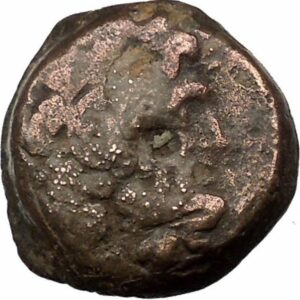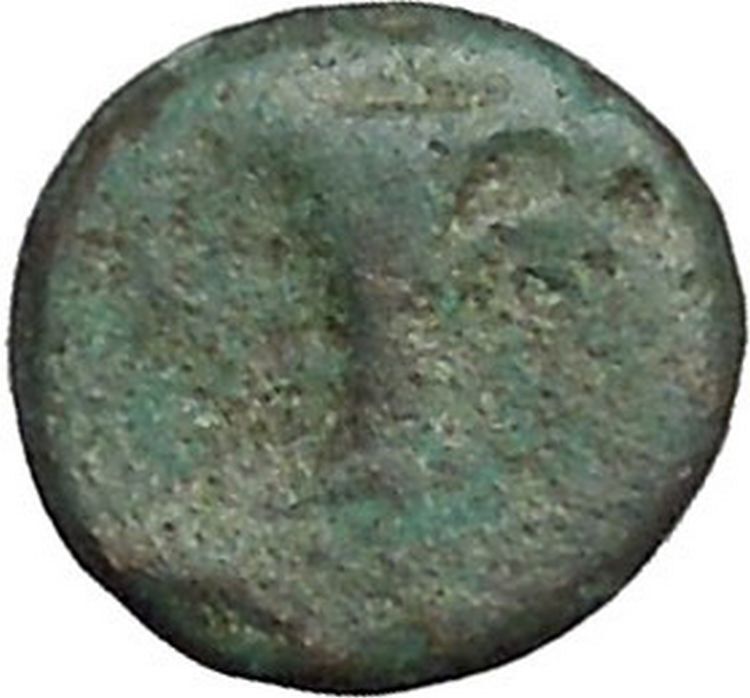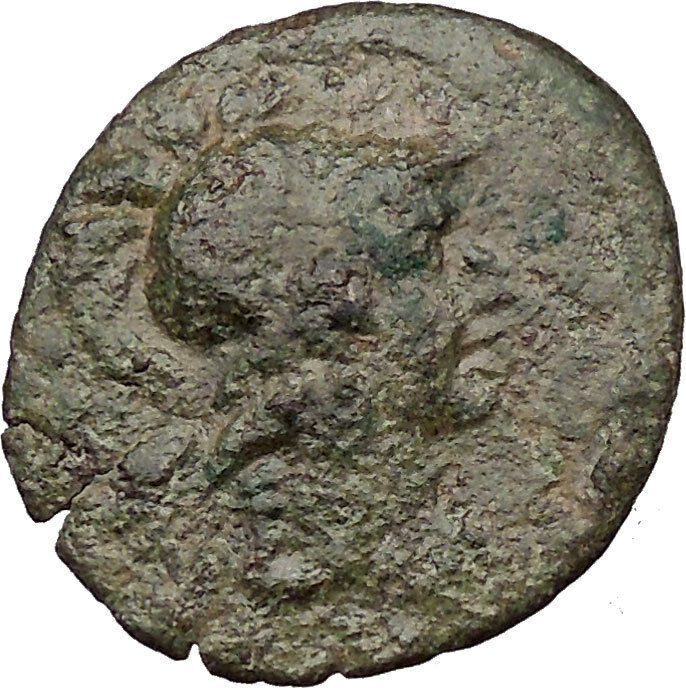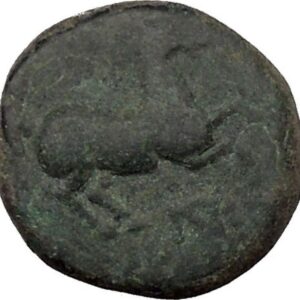|
Greek city of Akanthos in Macedonia
Bronze 16mm (3.51 grams) Struck circa 400-358 B.C.
Reference: Sear 1371 var. (head right); SNG ANS 53-5 var. (head right)
Head of Athena left, wearing crested helmet.
A-K/A-N within wheel of four spokes.
You are bidding on the exact item pictured, provided with a Certificate of Authenticity and Lifetime Guarantee of Authenticity.
 Athena or Athene (Latin: Minerva), also referred to as Pallas Athena, is the goddess of war, civilization, wisdom, strength, strategy, crafts, justice and skill in Greek mythology. Minerva, Athena’s Roman incarnation, embodies similar attributes. Athena is also a shrewd companion of heroes and the goddess of heroic endeavour. She is the virgin patron of Athens. The Athenians built the Parthenon on the Acropolis of her namesake city, Athens, in her honour (Athena Parthenos). Athena’s cult as the patron of Athens seems to have existed from the earliest times and was so persistent that archaic myths about her were recast to adapt to cultural changes. In her role as a protector of the city (polis), many people throughout the Greek world worshiped Athena as Athena Polias (“Athena of the city”). Athens and Athena bear etymologically connected names. Athena or Athene (Latin: Minerva), also referred to as Pallas Athena, is the goddess of war, civilization, wisdom, strength, strategy, crafts, justice and skill in Greek mythology. Minerva, Athena’s Roman incarnation, embodies similar attributes. Athena is also a shrewd companion of heroes and the goddess of heroic endeavour. She is the virgin patron of Athens. The Athenians built the Parthenon on the Acropolis of her namesake city, Athens, in her honour (Athena Parthenos). Athena’s cult as the patron of Athens seems to have existed from the earliest times and was so persistent that archaic myths about her were recast to adapt to cultural changes. In her role as a protector of the city (polis), many people throughout the Greek world worshiped Athena as Athena Polias (“Athena of the city”). Athens and Athena bear etymologically connected names.
Acanthus or Akanthos (Greek: Ἄκανθος or Modern Greek: Aχανθος) (modern town of Ierissos, also Erisso) was an ancient Greek city on the Athos peninsula. It was located on the north-east side of Akti, on the most eastern peninsula of Chalcidice. Strabo and Ptolemy erroneously place Acanthus on the Singitic gulf, but there can be no doubt that the town was on the Strymonic gulf, as is stated by Herodotus and other authorities: the error may have perhaps arisen from the territory of Acanthus having stretched as far as the Singitic gulf. The name of the ancient city (derived from the acanthus bush) is due to the thorny nature of the area or to the thorny nature of the town’s foundation.
History
Foundation
It was founded by 7th century BCE (the archaeology suggests 655 BCE) by colonists from Andros, according to Thucydides. Plutarch, on the other hand, referred to it as a mixed colony of Andrians and local Chalcidians, which was founded on the “Coast of Drakontos”, in place of a preexisting civilization. He writes that settlers from Andros and Chalcis arrived on the shore at the same time. The natives of Acanthus, seeing the crowd of settlers, became frightened and left the city. The settlers sent an explorer each to see what had happened and, as they approached the city and realized it was empty, ran to be the first to take over the land for their fellow countrymen. The Chalcidian was the fastest but the Andrian, seeing he was losing, stopped and threw his spear on the wall’s gate, before his opponent arrived. A court case followed, which was won by the Andrians, because as they protested, they had just about taken over the city first.
Growth
Its growth during the Archaic period is reflected by the wide circulation of its currency, first minted around 530 BCE with the distinctive emblem of a lion killing a bull – an allusion to Herodotus’s account (vii. 125) that on the march of Xerxes from Acanthus to Therma, lions seized the camels which carried the provisions – at least 92 different types of coins have been found. Its economic resources emanated from the mining and wood from the nearby forests, but also through agricultural and vegetable goods that were transported through the sizable harbor.
The first historical reference, in Thuycidides, from mid-6th century BC, connects the city with the Persian Wars, during which the townsfolk officially welcomed the Persians and willingly helped with the digging of the canal for Xerxes, 480 BCE, for which Xerxes richly rewarded them. They declared one of his relatives who died in the area, named Artahei, a hero, and willingly took part in the expedition against Greece. After the Persian wars Acanthus became a member of the Athenian Alliance, paying tribute of three talents. In 424 BCE, after a short siege and oratory by Brasidas, the city was convinced to ally itself with the Spartans, although Thucydides remarks the greater likelihood that it was the threat to destroy their profitable vineyards, rather than Brasidas’s rhetoric, that truly moved the Acanthians.
|











